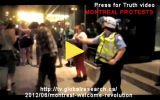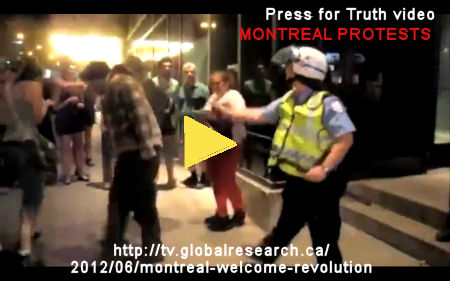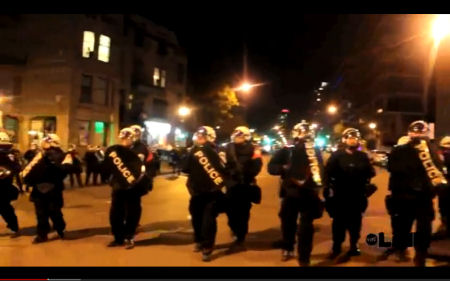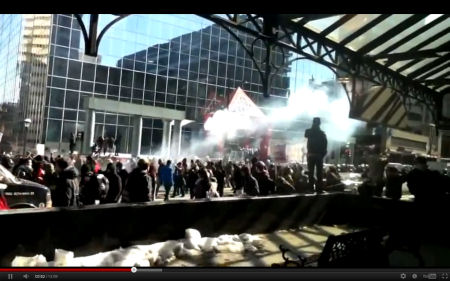 In Montreal protests against making university students pay for tuition have been ongoing for 100 days and more. Recently a draconian law, Bill 78, that limits protests and free speech rights in Quebec, has turned the protests there from being just about tuition fees, to a fight for civil liberties. Australians can learn a lot about how to protest and the concept of 'throwing your body in the machine' from this video. This writer expresses solidarity with the Québécois students.
In Montreal protests against making university students pay for tuition have been ongoing for 100 days and more. Recently a draconian law, Bill 78, that limits protests and free speech rights in Quebec, has turned the protests there from being just about tuition fees, to a fight for civil liberties. Australians can learn a lot about how to protest and the concept of 'throwing your body in the machine' from this video. This writer expresses solidarity with the Québécois students.

Student protests in Montreal have lasted over 100 days. Students are protesting against attempts to charge fees for university study - something that Hawke and Keating did years ago to Australian students, and now our universities host vast quantities of foreign students who have priced out most Australian fee-paying students.
The recent passage of Bill 78, a law that limits protests and free speech rights in Quebec, has turned the protests there from being just about tuition fees, to a fight for civil liberties.

Australians can learn a lot about how to protest and the concept of 'throwing your body in the machine' from this video.
Maybe as important, Australians can compare themselves to these French Canadian students and ask what it is about the Australian system that permitted our country and our universities to be sold off with so little effective protest.There is a difference: the French Canadians are a tribe - there is relatively low immigration there. Similar tactics to those used in Australia of increasing immigration to split communities by importing students and employees are being brought in in French Canada now.

The rest of Canada has a different system and is as far down the path to disorganisation as Australia.
The French Canadians still remember they are citizens, not clients. Time Australians relearned this concept.
See also: Québec students fight globalisation of tertiary education of 26 May, Pots & Pans Protest: Angry Canadians Make a Bang of 28 May on Global Research TV.
See also: Québec students fight globalisation of tertiary education of 26 May 2012, Pots & Pans Protest: Angry Canadians Make a Bang of 28 May 2012 on Global Research TV, BEYOND THE STUDENT PROTEST MOVEMENT: Where Next for the Quebec Mobilizations? of 9 June 2012 by Richard Fidler on Global Research TV.

Comments
admin
Sun, 2012-06-03 23:12
Permalink
Mass rallies grip Montreal as tuition talks fail
From Russia Today of 2 June
Thousands of Canadians marched in Montreal despite rainy weather. The peaceful protest against tuition hikes kicked off in the province of Quebec after talks between students and the local government failed. ...
Up to 7,000 students, their parents and supporters were marching by mid-afternoon on Saturday according to CLASSE – the largest and most militant of the student groups behind the protests. Some wore costumes and played music.
admin
Mon, 2012-06-11 21:27
Permalink
Will Australia impose sanctions against Quebec dictatorship?
This question below was posted to ABC Television's Q and A website to be put to Prime Minister Julia Gillard tonight.
The ruling Liberal party of Quebec, which is attempting to impose University fees against popular protests, only received 33% of the vote in the 2008 provincial elections five years ago. It was only able to hold onto power because of the undemocratic first-past-the-post system.
Assad got a much higher vote in elections that were held in Syria this year in spite of Syrians being threatened with death by insurgents if they voted.
Why won't your government impose sanctions against Quebec?
Geoffrey Taylor
Tue, 2012-06-12 00:04
Permalink
By-elections to be held in Quebec on Monday
The following was posted in response to the article A night of protest and chaos as Montreal hosts F1 auto race of 9 June on the web site entitled A Socialist in Canada. It is still awaiting approval. Update, 13 Jun 12: Comment is still "awaiting approval".
If there was a fair electoral system in Quebec, it should be possible to translate popular rejection of austerity and the globalisation of Quebec’s tertiary eduction system into a parliamentary majority. Unfortunately, Quebec’s “first-past-the-post” system is not a fair system as you have pointed out.
Part of the struggle by students and their supporters should be:
1. A demand for a fairer electoral system, namely preferential voting[1]; and
2. Rejection of unfair parliamentary majorities resulting from
“first-past-the-post”.
More effective use of the Internet with bi-lingual web-sites and open discussion could help overcome the bias of the news media against students and their supporters.
Footnote(s)
[1] It is known here in Australia as “preferential voting”. In the U.S it is known as or “instant-runoff” voting. By the way, “instant-runoff” would have prevented George Bush’s election in 2000
Geoffrey Taylor
Tue, 2012-06-12 00:15
Permalink
Quebec by-elections in LaFontaine and Argenteuil ridings
The following was posted in response to the article Quebec: Making War on Our Children on the web site entitles A Socialist in Canada. It is still awaiting approval.
Update, 13 Jun 12: Comment is still "awaiting approval".
I am also interested to know the outcome of the elections that were held on Monday in the Quebec ridings of LaFontaine and Argenteuil.
It would have been a fantastic opportunity to demonstrate to the world the illegitimacy of the current Quebec Liberal Party dictatorship which only secured 33% of the votes in 2008 (See also Wikipedia article on 2008 Quebec elections.)
Geoffrey Taylor
Sun, 2012-06-24 19:33
Permalink
Second United Nations official blasts Quebec's anti-protest law
By Lee Berthiaume, Postmedia News June 21, 2012
OTTAWA - Quebec's controversial anti-protest law came under fire at the United Nations for the second time in less than a week Thursday, with a UN special rapporteur describing it as "particularly harsh."
Presenting his annual report to the 47-member UN Human Rights Council, Maina Kiai said violations of the freedoms of peaceful assembly and association "cut across the entire world," and there isn't a single region where problems do not occur.
'"There are some places, some countries, where the laws are particularly harsh in terms of restricting the freedom of association," Kiai added.
"I'll just mention just a few: in Algeria; Belarus; Canada, in particular in terms of the province of Quebec; Ethiopia; Jordan; Malaysia; Russian Federation; and Switzerland, in the Canton of Geneva, especially."
...
Bill 78 requires organizers of gatherings of more than 50 people to provide eight hours' notice of the itinerary and length of the event.
The special rapporteur's comments came shortly after Belarus criticized him for not being more critical of Canada over police actions used to disperse students demonstrating against tuition hikes in Montreal in recent months.
Belarusian diplomat Andrei Taranda presented a list of dates on which police made mass arrests and noted incidents where tear gas and clubs were used against the demonstrators.
"Have you tried to delve into the reasons behind these frequent protest movements?" asked Taranda.
Canada imposed sanctions against Belarus in 2006 after elections marred by widespread fraud and harassment returned President Alexander Lukashenko to power and prompted a violent crackdown on pro-democracy demonstrations. The two countries have had a chilly relationship ever since.
...
Quebec Premier Jean Charest bristles after UN expresses chagrin over terms of Bill 78 of 19 June. - Ed
Add comment